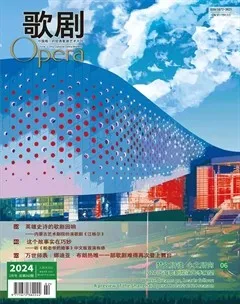語(yǔ)言和音樂(lè)
Joanna C.Lee

小瓊:不久前,當(dāng)我在清理書(shū)房里的文件時(shí),發(fā)現(xiàn)了我早先的博士論文:30多年前寫(xiě)的長(zhǎng)達(dá)600頁(yè)的論文!當(dāng)時(shí),我是一名專(zhuān)注于研究德國(guó)先鋒音樂(lè)的音樂(lè)學(xué)學(xué)者,我感興趣的具體研究方向是拓展聲樂(lè)技術(shù)。
小薇:哇!以前從未聽(tīng)你提起過(guò)這些。人類(lèi)的聲音確實(shí)非常靈活,可塑性很強(qiáng)。它可以通過(guò)多種方式拉伸和彎曲;它顯然比任何樂(lè)器都多才多藝。
小瓊:想想當(dāng)代作曲家使用的微分音。但我想談的是歌手學(xué)習(xí)不同語(yǔ)言的能力。試想下,美國(guó)人用捷克語(yǔ)唱歌,日本人用法語(yǔ)唱歌,德國(guó)人用中文唱歌……語(yǔ)言是可以學(xué)習(xí)和精通的。只要歌手或演講者熟練掌握某種語(yǔ)言,他們就可以用它做任何事情。
小薇:你還沒(méi)有說(shuō)你論文的細(xì)節(jié)。你關(guān)注的是哪位作曲家和哪些作品?
小瓊:我研究了兩部最初為音樂(lè)會(huì)舞臺(tái)構(gòu)思的作品,但后來(lái)它們作為戲劇場(chǎng)景(在歌劇舞臺(tái)上,甚至作為電視電影)延長(zhǎng)了藝術(shù)生命。匈牙利出生的作曲家捷爾吉·利蓋蒂(1923—2006)于1962年受北德電臺(tái)委托創(chuàng)作了《歷險(xiǎn)》。1966年,他為廣播電臺(tái)的同一當(dāng)代音樂(lè)系列創(chuàng)作了續(xù)集《新歷險(xiǎn)》,取得了巨大成功。
小薇:我在網(wǎng)上看到,這兩部作品是為一個(gè)室內(nèi)樂(lè)團(tuán)和三位獨(dú)唱歌手(花腔女高音、女低音和男中音)譜寫(xiě)的。他們演唱時(shí)所用的“語(yǔ)言”真的很有趣。這是利蓋蒂自己發(fā)明的一種虛構(gòu)語(yǔ)言——作曲家在樂(lè)譜上標(biāo)注出的是國(guó)際音標(biāo)(IPA)的符號(hào)。
小瓊:事實(shí)上,無(wú)論聽(tīng)眾是否接觸過(guò)某種特定的語(yǔ)言,都能夠通過(guò)表達(dá)或詮釋的方法來(lái)進(jìn)行交流。對(duì)于那些不熟悉國(guó)際音標(biāo)的人來(lái)說(shuō),它或多或少是一種發(fā)音的記憶系統(tǒng),在任何英語(yǔ)字典中都可以找到音標(biāo)。這確實(shí)是一種專(zhuān)業(yè)的語(yǔ)言學(xué)習(xí)方式。我還記得幾年前,我參加了一個(gè)由中國(guó)女中音梁寧教授開(kāi)設(shè)的大學(xué)課程,她讓所有的聲樂(lè)學(xué)生學(xué)習(xí)國(guó)際音標(biāo)。她的目標(biāo)是讓學(xué)生們能流利地使用國(guó)際音標(biāo),這樣他們就可以在總譜上添加自己的備注作為發(fā)音指南。
小薇:幸運(yùn)的學(xué)生們!下次我查字典的時(shí)候,我也會(huì)特別注意那些國(guó)際音標(biāo)!

Joan: Not long ago, while cleaning my files in the study, I found my old PhD dissertation: 600 pages I wrote more than three decades ago! Back then, I was a musicological scholar focusing on the German avant-garde and the specific topic that interested me was extended vocal technique.
Valery: Wow! Ive never heard you talk about this before. The human voice is indeed very flexible and malleable. It can be bent and stretched in so many ways; its clearly more versatile than any musical instrument.
Joan: Think of the microtones used by contemporary composers. But what I want to talk about is how well singers can learn different languages. Think of an American singing in Czech, a Japanese singing in French, a German singing in Chinese. Languages can be learned and perfected. As long as the singers or speakers master diction, they can do anything.
Valery: You havent told me about the details of your dissertation. Which composer did you focus on? And which compositions?
Joan: Well, I studied two works that were first conceived for the concert stage, but then extended their lives as dramatic scenarios (on the operatic stage, even as television film). The Hungarian-born composer Gy?rgy Ligeti (1923–2006) wrote Aventures, commissioned by the North German Radio, in 1962. It was such a success he wrote a sequel, Nouvelles Aventures, for the same radio contemporary music series in 1966.
Valery: I read online that these two works are scored for a chamber ensemble and three solo singers (coloratura soprano, alto, baritone). The “l(fā)anguage” they sing is really interesting. Its a made-up language invented by Ligeti himself—what the composer noted on the musical score are symbols of the International Phonetic Alphabet (IPA).
Joan: Indeed, expression and meaning can be communicated whether or not the listener understands a specific language. For those unfamiliar with the IPA, its more or less a notation system for pronunciation, which they print with each word in a dictionary. Its truly a professional way of learning diction. I still remember years ago attending a university class taught by Chinese mezzo-soprano Liang Ning, who was making all of her vocal students learn IPA. Her goal was for them to be fluent in IPA, so they can add their own markings to the score as a pronunciation guide.
Valery: Lucky students! Next time I consult a dictionary, Ill look for the IPAs!

